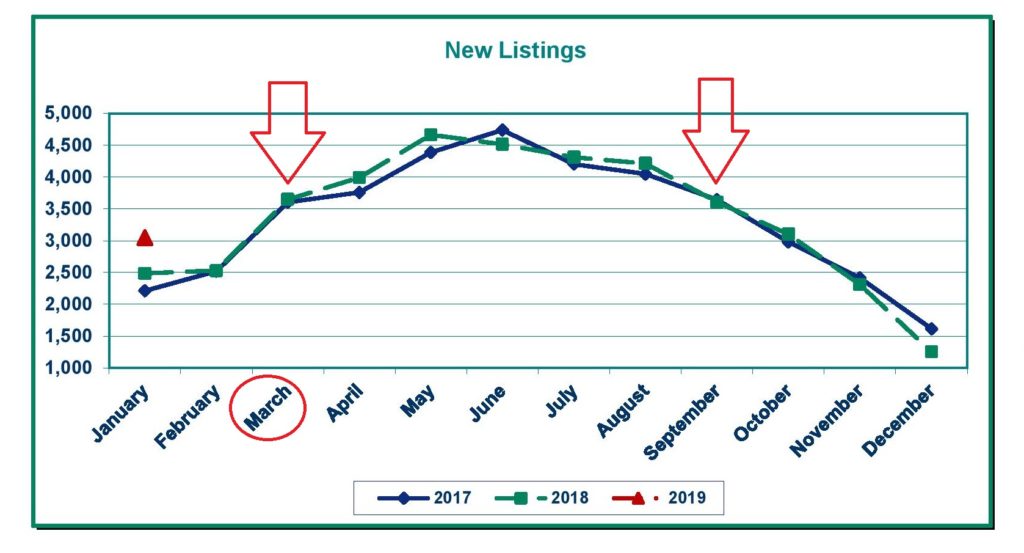‘When’s too soon to list my house for sale?’ is a common homeseller question Realtors are asked. To be sure, there are a host of factors that influence the optimum time of year to sell. When considering the best time to sell your home, several factors stand out. One is the amount of homeseller competition based on predictable seasonality, such as Springtime, when many homesellers place their property on the market. Another related, but independent dynamic is competing homeseller inventory, which can fluctuate wildly. Curious about factors to consider when timing your home sale? Find out more…in this insightful Oregon real estate podcast!

Each season of the year has some built in advantages, even during the holidays. But especially enticing for home sellers hoping to beat the Spring rush is the dynamite combination of highly motivated buyers, plus reduced seller competition. Speaking of competition, it’s helpful to understand that when the balance of more sellers enters the dynamic, buyers have more of a choice and are in a better position to pit one seller against another in search of their best deal.

Charting Your Course
A month-by-month new listings chart illustrates the seasonality of real estate. In Oregon, the months between October through February provide the lowest homeseller competition, with fewest homes placed on the market. This means March through September is typically our ‘hottest’ time for home sales. Does this mean if you don’t have your home on the market before March, you’re ‘out of luck?’ No, because seller competition is but one element to consider.
That’s because housing inventory fluctuates, irrespective of season. And depending on how many homebuyers are looking, demand can be considered relative. We can help adjust for seasonality to better determine buyer demand by using a buyer/seller ratio. For example, typical housing demand in a particular community or neighborhood might be 100 buyers interested in 50 homes in June, a 2 to 1 ratio, then fall to 50 buyers showing interest in 25 homes in January, also a 2 to 1 ratio. Under such a scenario, relative demand would be the same, which should result in a similar amount of real estate activity.
Yet while relative housing demand may be a functional rule of thumb in theory, it doesn’t take into account one other extremely important factor: Motivation. That’s because in off season periods, homebuyers frequently have a more urgent need to buy, or they would be looking during the more usual times of Spring and Summer. Looking for a house in the bad weather typically indicates a higher-than-usual need to purchase. In addition, some buyers beginning in April or May have the luxury of months to ponder their next move.

‘Seize The Gray’
The short answer is that it’s usually never too early to place your home on the market…for good reason. That’s because highly motivated homebuyers often make a home purchase their New Year resolution and start looking early…sometimes before Christmas.
Many buyers take a week or two off during the holidays, but beating the Spring homeseller rush gives you an early advantage against a very large number of competing homesellers who will be ‘up and running’ during Oregon’s earliest good weather. This clever strategy places your property before these highly motivated buyers before a glut of competing homesellers goes head-to-head against you.
But the good news is that in order to take advantage of seasonal ‘soft spots’ in seller competition, homesellers needn’t place their properties on the market during the holiday season, or even immediately adjacent. There’s plenty of ‘gray area’ to go around throughout the year and that’s typically enough to help make your house stand out even more from the competition. Navigating around May through August is usually enough to help counter higher-than-usual competing listing activity. And if you happen to notice lower than usual housing inventory, that can be a big help for homesellers, too.

Timing Your Sale—Without Unpleasant Surprises
If the goal is to get a ‘jump start’ in selling your home with less competition, consider several factors. This includes getting an honest evaluation of your property by a licensed Realtor. But first, ask your agent for an honest opinion. Not sure you want an honest opinion? Check out our previous podcast and feature length article ‘Can You Handle An Honest Real Estate Agent?’ here.
The experience and objectivity of an expert Realtor is difficult to overstate. Take repairs, for example. If you truly want to maximize your return and your home has needed repairs, it’s unrealistic to expect buyers to absorb that expensive roof repair ‘hit’ on their own by coming in with a full price offer on your property. What you need is a professional analysis of necessary repairs that could make a difference in discouraging buyers. And aside from repairs, sometimes it’s what you don’t do that can make a difference. Like maybe don’t put in new carpet or have the exterior painted, if it’s going to push your price up considerably.
The ‘School Year’ Equation
Some buyers aren’t the likeliest candidates for ‘off season’ marketing by homesellers. This can include families with children, a significant homebuyer pool for many. That’s because families with kids frequently begin their home hunt by the end of school in late Spring, usually settling into their next home by September. On the other hand, much of the impact of losing these buyers using ‘off season’ marketing depends on the property type you’re selling. Are you selling a tiny condo six floors up, or a 5 bedroom home with a large yard? Big homes with fair sized yards or those located close to parks are often better housing matches for larger families. Conversely, if you decide to sell a smaller home out of season, marketing to other suitable buyer groups can substitute for larger families, with significant success. Good prospects for such smaller or more urban homes might include ‘Baby Boomers,’ professionals, singles, or ’empty-nesters’ with grown children.

Now You See It…
An interesting real estate phenomena can occur when buyer interest suddenly increases for a home that’s been sitting on the market for a while, with few showings. Then suddenly: ‘Whoosh,’ multiple offers on the table! What could possibly create such a positive shift for homesellers? Buyer activity can spike quickly once a competing property is sold or otherwise off the market. Have you ever wondered why a house that’s been sitting on the market for a long time is suddenly ‘snapped up?’ Price changes aside, sometimes it’s because the most similar competing home is now off the market. This has the effect of buyers turning their attention on the next closest replacement, which is the ‘substitution principle’ in action. That’s where the maximum value of a property can be established by the cost of acquiring an equivalent substitute property with similar use and features.

Thinking About Selling Your Oregon Home?
Go with professionalism, experience and results. Contact Certified Realty for a free homeseller consultation by calling (503) 682-1083, or use the convenient form below.